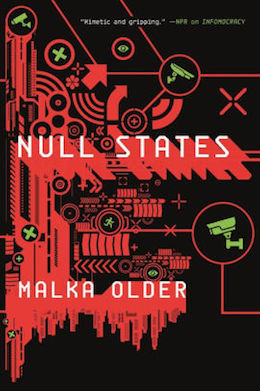Malka Older’s Infomocracy (book one of the Centenal Cycle) made its debut last summer to rapturous praise, including from The Washington Post and The New York Times Book Review. (I admired it too, although I was late to the party.) Now, in Null States, Older returns to the world of Infomocracy, with a cast of characters both old and new.
Two years have passed since the last global election, and global microdemocracy is still dealing with the fallout from the controversies and illegalities that attended the change of Supermajority. The new Supermajority is struggling to define itself and to make its case as the first new Supermajority since the beginning of the global microdemocracy system, while Information—the pervasive and supposedly objective organisation and system that underpins global microdemocracy and makes it possible—is still somewhat under pressure from the weaknesses that were revealed during the last election. Meanwhile, a shooting war in Central Asia, between two states that aren’t part of the microdemocracy system, is putting pressure on the system, with several centenals—electoral and administrative divisions—squeezed between the shooting war and the nation-state of China, which is not very happy about the situation near its borders.
Roz is part of a special Information team that helps in (potential) crisis areas. She’s sent to a region formerly part of the nation of Sudan, which only joined microdemocracy at the last election. The new government is very local, led by a young and charismatic leader—who’s assassinated in front of the Information team. His assassination may or may not be part of a pattern, and may or may not be a destabilising force. Roz finds herself at the heart of a mystery and local politics that may prove to be globally important.
Meanwhile, Mishima—a former Information agent with several very specialised skills, and one of the main characters of Infomocracy—goes undercover at the headquarters of the Heritage government on behalf of Information. Heritage has been threatening to secede from microdemocracy over sanctions imposed on them—or potentially about to be imposed upon them—as a result of their involvement in shenanigans around the time of the last election. They’re one of the largest global players, and a secession would threaten the microdemocracy system as a whole, when it’s already potentially threatened by a shooting war creeping over its borders.
Both Roz and Mishima will discover a lot more than they expected, and face the truth that Information and the global microdemocracy system is a lot more fragile and a lot more corruptible—and potentially a lot less lasting—than anyone might have hoped.
This is a story about governance and governing, about power and systems, and the edges of both—the parts where they break, and warp, and potentially break down. Older’s gift is to make those systems fascinating and human: relevant, and easy to grasp. Well, one of her gifts: she has great skill with evoking place and its complicated histories, when her characters stay in one location long enough. This is notable in the parts of Null States set in the region formerly part of Sudan, when Roz comes face to face with ways of life and ways of relating to the world that start with very different assumptions than the ones she’s used to.
Null States is a complex, sprawling novel, but one that nonetheless has the tight control and pacing of a really good thriller. Older keeps many different narrative threads rolling without tangling them up. They branch and return, and it’s still easy to follow them even in the midst of many things happening at once—because Older’s characters are focused on what’s important to them. It makes them really human and really familiar, in their conflicts and their new relationships, their uncertainties and their heartbreaks. There are a lot of characters, although not so many viewpoint characters, but all of them, every one, feel like individuals.
Science fiction is frequently about power and revolution, seldom about the technical stuff that makes power possible—seldom about governing, as opposed to governments in crisis. Null States, like Infomocracy, feels refreshingly new and strange—wondrously strange, in fact—because of its focus on the nitty-gritty of how things get done, and how things can be done, and whether or not this is a stable system or one whose equilibrium has reached a tipping point of some kind.
I really enjoyed Null States. It’s entertaining. And it is massively geeky about governance. I like that. I want to read more. When’s the next one? I hope soon.
Null States is available now from Tor.com Publishing.
State Tectonics, book three in the Centenal Cycle, publishes in Fall 2018.
Liz Bourke is a cranky queer person who reads books. She holds a Ph.D in Classics from Trinity College, Dublin. Her first book, Sleeping With Monsters, a collection of reviews and criticism, is out now from Aqueduct Press. Find her at her blog, where she’s been known to talk about even more books thanks to her Patreon supporters. Or find her at her Twitter. She supports the work of the Irish Refugee Council and the Abortion Rights Campaign.










